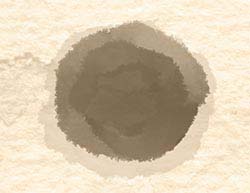Dear Mrs. Thomas,
My mother canned so much in the 40’s that the basement floor was carpeted by a mosaic of glass, a bass relief, would appear from the top of the stairs, of shadowy and glittering circles outlined in a terra cotta color of protruding rubber gaskets. She canned everything that came from their gardens. You had to pick your way carefully across the floor to the furnace, for instance, or to find a particular jar. Some jars sat for months or even years, I expect, and from time to time, odd explosions would splutter up through the floor; wheezes and long hissings came slithering up the short stairway into the kitchen. Ma wasted nothing. Almost all our produce came from our own dirt. And our milk was from Fleece’s Farm. I would walk up about five blocks with our boarden Nazareno, with empty bottles. We would wait in the farmhouse kitchen as the Fleece sons would roll in large steel tanks. I remember the smell of the room and the sloshing inside the torpedoes, and the vapor and the sweet steamy white smell of milk just out of the utter, as the containers were tilted by the big boys to fill up Mrs. Fleece’s grand pitcher. I’ve often recalled her sliding her hand way around through the handle to sort of cradle the heavy load with her whole arm so she could poor the creamy streams accurately into our empties. She must’ve used a funnel, but the legend in my memory sees her not spilling a drop as she aimed the milk fall perfectly through the gaping circle mouth of each bottle; and cut off the flow just as the milk reached the right level, exactly at the bottom line of the flared lip. But the final move was the capper, in more ways than one. She’d reach behind her and palm off a shelf several stiff cardboardy circles, each with a tiny protruding tongue. Then she positioned each bottle just so slightly to her right, and jammed snap a lid into each one. The sound gave me a shiver each time. Phlpp, phlpp! One-two. She was smooth, quick, accurate, and cheerful. At the end of the bottle line she’d smile, thumbs out of her palm a couple extra caps and slip them over the counter to me. Fresh ones! Stiff, clean, unused, and the tongue tabs not even bent. They were treasures. As long as they remained stiff and unsoiled. Those slick little heart circles were purity, a new beginning, first time around, original, unstained by use, but useful; only what a shame to press on them, crease them, let the tabs go limp. Keep them dry and lined up, the tabs squarely set a top one another, the edges of the circles aligned exactly. Neat, but this neatness never lasted. The caps got bent and misaligned in my pocket and not a day later they’d be used goods, floppy like the ones pulled off the bottles we brought home. At the kitchen table, the rule was strict: shake the bottle of milk before you pour. ‘Hey, hey, what do ya think yer doin? Shake it!’ That was to get the cream distributed. You weren’t supposed to squander the pale yellow portion that rested in the neck of the bottle, you had to spread the wealth before you filled the glasses. Pa had certain values.
“You’re not very hungry, eh?”
“What do you mean?”
“I’m eating.” As I chewed a mouthful of meat.
“Aren’t you going to have some soup?”
“I just want la carne.”
“That’s ale?”
“Yeah, why?”
“If you’re hungry, you should eat. Have some soup, first.”
“I–.” I took some soup and ate it quickly, reaching as I downed the last spoonful, for the plate with the meat on it. Pa was standing with a plate in his hand, probably soup, eating and watching.
“Take some bread.”
“I don’t want any.”
“You didn’t eat much soup, you’ll still be hungry, if you don’t eat some bread. Have some bread and meat.”
“But I just want…”
“The breads fresh. It’s good today.” I took some bread. Pa finished his soup, still hovering and reached for some bread. Ma offered him a plate of meat. Pa waved it off. “No, no, per Dan’s,” sticking his chin out in my direction. “For Danny.” Later he took some meat with his bread.
“Giova, why don’t you sit down?”
“No, you eat, never mind me. I’m alright.”
